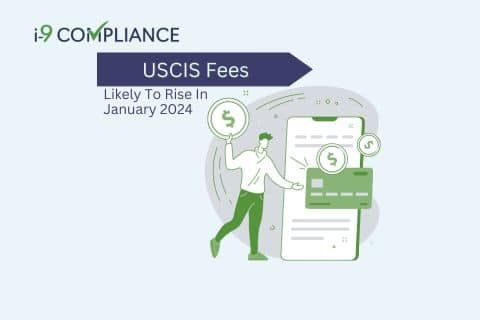USCIS Fees Likely To Rise In January 2024

December 28, 2023
The U.S. Citizenship and Immigration Services (USCIS) has struggled with a longstanding backlog and a sudden and enormous influx of refugees. As such, the USCIS has worked to address these challenges by attempting to increase its fees. The agency introduced the new fee increase in a proposed rule, which will take effect in January 2024.
The proposal would considerably increase the fees for naturalization H-1B visas and green cards. However, the USCIS will not decide on the final fee increases until early next year. These changes are worth noting now, as the significant expense increase may pose challenges for some employers.
Why the Rise in Fees?
The current fee schedule went into effect in late 2016. Since then, the USCIS has attempted to raise these fees several times, as they fund almost all of the agency’s expenses.
During the COVID-19 pandemic, the USCIS faced enormous funding challenges. These struggles caused a 40% decline in revenue. As such, the agency froze hiring and lost workers. These repercussions led to an inability to keep up with processing. This struggle led to a considerable backlog of applications, which the USCIS has since attempted to tackle.
The influx of asylum seekers also compounded the USCIS’s challenges. Thus, the USCIS endeavored to address both issues by hiring 7,778 individuals and upgrading its technology and call centers. However, these upgrades will cost an estimated $1.9 billion annually. According to the USCIS, the increased fees should cover these costs.
Fee Increases
The USCIS’s proposed rule received comments from over 6,000 sources, most of which opposed the increased fees. This opposition led to the postponement of a final decision to early next year.
Under the proposed fee increase, H-1B cap registration fees would rise by 2,050% to $215, and petition fees would increase by 70% to $780. Online applications for Employment Authorization Documents (EADs) would rise by 35% to $555 and paper filing by 59% to $650. Applications for adjustment of status with biometric services would increase 26% to $1,540.
Unfortunately, many applying for adjustment of status under the agency’s current plans face a specific challenge. According to the plans, it would institute separate document fees for EADs and travel documents. Those with pending green card applications currently have these fees waived. Without these waivers, those seeking to work and travel while waiting for a green card would face significantly higher costs.
The USCIS will likely introduce the proposed fee increases or an adjusted schedule early in 2024. Employers and their workers may benefit from filing any applications with the USCIS before this occurs. Employers should also focus on documentary compliance, such as the employment eligibility verification (Form I-9) process. One way to ease compliance concerns is using an electronic I-9 management tool. This tool guides HR personnel through every step, offers digital storage, and optional notifications when to take action.
Ensure compliance today by switching to an electronic I-9 management tool with I-9Compliance.